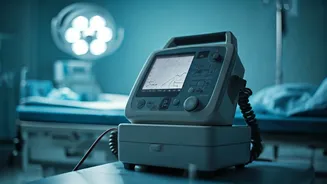Recognize The Signs
Understanding the symptoms of a heart attack is the first and most crucial step in responding effectively. It's not just about the well-known chest pain.
Many people, especially women, may experience less obvious signs. These can include discomfort in the arms, back, neck, jaw, or stomach. Shortness of breath, cold sweats, nausea, or lightheadedness are also potential indicators. Recognizing any of these, especially in combination, demands immediate action. Time is critical during a heart attack, as delayed treatment can lead to significant heart damage or even death. Being able to swiftly identify these symptoms significantly improves the chances of survival and reduces long-term harm.
Call for Help
Once you suspect you are having a heart attack, the most crucial immediate step is to call for emergency medical assistance. Dial the emergency number in your area without delay. Explain your symptoms clearly and provide your exact location. Do not attempt to drive yourself to the hospital. Emergency responders are trained to provide life-saving interventions en route. They can start treatment immediately, such as administering medications and monitoring your vital signs. Do not hesitate, as every moment counts when dealing with a heart attack. Delaying the call for help can significantly worsen the outcome, so swift action in summoning help is critical to survival.
While Waiting
While waiting for the ambulance, there are specific actions you can take to improve your chances. First, try to remain as calm as possible. Panicking can increase stress on your heart. If you have been prescribed medication, such as nitroglycerin for chest pain, take it as directed. If you're not allergic, and have aspirin accessible, take a standard dose (325 mg) or four low-dose (81 mg) aspirin tablets. Aspirin can help thin the blood and reduce clot formation, which may help mitigate the attack's impact. Sit or lie down in a comfortable position to reduce the workload on your heart. Make sure to unlock your door to allow the medical team easy access. Be ready to answer questions and provide information to the paramedics when they arrive, which will assist them in providing swift and effective care.
Post-Event Actions
After receiving medical treatment, it is vital to follow the medical team's advice on post-attack care. This involves adhering to medication schedules, attending follow-up appointments, and making lifestyle adjustments. This may include changes to diet, exercise routines, and stress management practices. Cardiac rehabilitation programs can be invaluable in assisting your recovery. These programs provide supervised exercise, education, and support to help you regain strength and confidence. Additionally, you should monitor your heart health and be prepared to discuss any new or returning symptoms with your medical provider. Understanding your risk factors and following a healthy lifestyle will help minimize the likelihood of a repeat cardiac event.











